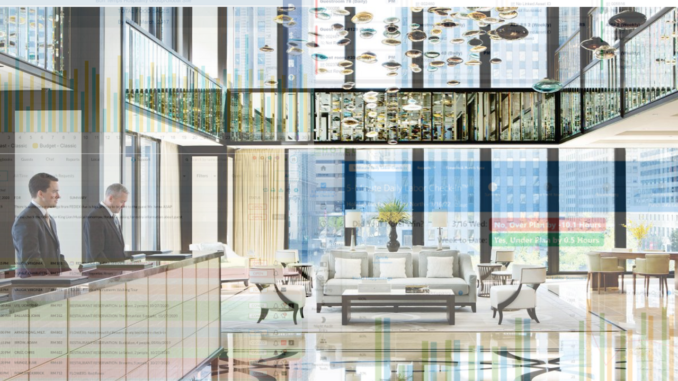
Jason Luo, Chief Revenue Officer of Actabl - 5.8.2023
I love to play tennis. Now, I’m not claiming any sort of professional status here, but allow me to make an analogy. When I watch a tennis match, it’s a very different experience than someone watching who’s never played. For the nonplayer, you see athleticism and watch the ball flying back and forth over the net – but you miss the mental game at breakpoint, or an appreciation for top spin on clay and slices on grass, or the excitement in watching clashing styles of the top pros.
Once you know the game though, you pick up the nuances. You understand which strokes work best in different situations, which techniques to practice for improving your game. And you understand the scoreboard. In the end, just as understanding the nuances of tennis can improve your game, so can using technology to develop actionable insights from your data help you maximize your hotel profits.
Three Steps for Maximizing Hotel Profits
- Know the Scoreboard When hoteliers look at their property, or group of properties, the first challenge they face in maximizing profits is understanding the scoreboard for their business. You must be able to evaluate how well your business is performing, and identify any problems holding you back. To accomplish this, you need a solution that links up the disparate systems in your hotel so you can see both your historical and real-time data in a highly functional way.
- Build a Game Plan With the right data at hand, you can more clearly identify where your challenges lie, but that is just the start. The key is turning the data into insights and a game plan. The right technology solution lets you evaluate the right action to take. It helps you strategize which levers to pull and which pieces to influence to effectively overcome issues impacting your profitability goals.
- Execute the Game Plan And finally, to get the end result you’re looking for, you need to implement that game plan. It does no good if the coach keeps all the notes on strategy in their crib sheets but never communicates that strategy to the players. You need the right technology to disseminate your plan to all the members of your team – from front desk, to housekeeping, to maintenance – so they can all work in sync to execute it together.
Implement Tech to Optimize Labor Management Costs
When looking at your scoreboard, one area every hotelier struggles with right now is labor management and costs. The State of Hospitality Staffing, a research study from Instawork, shows over half of hospitality businesses recognize the need to raise pay to attract and retain workers, and 73 percent have already done so.
As an example, according to Actabl’s Hotel Effectiveness database, housekeeper wage rates have been rising steadily – even pre-pandemic – reaching $16/hour nationally. Combine this fact with the ongoing labor shortage and hoteliers everywhere are seeking ways to get more done with less people. One of the most effective ways to manage this is by putting a labor management platform into play.
For instance, you may regularly schedule four staff members to work at your front desk from 4:00 p.m. to 10:00 p.m. However, a quick analysis of real-time data concerning the number of check-ins and check-outs on a given day may reveal you need six workers from 4:00 p.m. to 7:00 p.m., but only one worker from 7:00 p.m. to 10:00 p.m. Employing analytics like this on a consistent basis can help you significantly cut your labor spend.
In conjunction with optimizing labor spend, hotel operators also need to ensure they’re getting the highest productivity from team members. Technology and analytics can help you quickly understand and correct specific issues impacting staff productivity.
Improve the Guest Experience and Drive Increased Profits
In addition to operational efficiency, guest experience also plays a role in your hotel profitability. If you have happy guests, your profitability will rise. Your loyal repeat visitors spend on average 67 percent more than new customers.
Several guest-facing technologies are extremely popular right now, such as mobile check-in, keyless entry, and upsell technologies. These solutions are important, but they only impact a fraction of a guest’s stay. It’s crucial for hoteliers to invest in technologies that impact the majority of the guest journey. This means deploying solutions that ensure you have the right people, in the right positions, at the right times, working together to delight your guests.
For instance, mobile check-in is great. However, for a guest who is exhausted from traveling, a smooth check-in process will not outweigh a room that is not ready. Guest experience relies partially on benefits but even more on avoiding catastrophes, which are more likely than ever before with short staffing and inexperienced staff.
Based on our operations insights data, we know a third of the time an engineer needs to help housekeeping turnover a room. And yet many hotels are not effectively coordinating the two teams. As a result, the guest may not be able to check-in simply because a lightbulb needs to be changed, or an inspector hasn’t yet confirmed a scuff mark on the paint has been cleaned. These types of productivity issues can be easily resolved with a technology solution for better staff coordination.
Get the Right Coach and Play to Win
You may be reluctant to implement technology solutions because you dread learning yet another new system, or you don’t understand the real value it can bring to your business. Or perhaps you get confused by the latest fads, such as the advancements in AI we’re currently seeing.
The key to understanding how a new tech solution can help launch your business to the next level, is choosing the right systems administrator to coach you. The right administrator will prioritize coordination and automation among your 15 to 20 different hotel systems, helping ensure everything works well together. And they’ll help you maximize profitability with tools to effectively budget and forecast demand, optimize labor management, and coordinate your team members for the greatest impact on a guest’s stay.
 Jason Luo is the Chief Revenue Officer of Actabl and the former CEO of ALICE. Previously, he was the COO of Paradigm leading product, engineering and payments. Bringing together four powerful hospitality tech solutions to maximize profits for hotel operators, Actabl is an award-winning software company exclusively focused on meeting the evolving needs of leading hospitality businesses.
Jason Luo is the Chief Revenue Officer of Actabl and the former CEO of ALICE. Previously, he was the COO of Paradigm leading product, engineering and payments. Bringing together four powerful hospitality tech solutions to maximize profits for hotel operators, Actabl is an award-winning software company exclusively focused on meeting the evolving needs of leading hospitality businesses.
Are you an industry thought leader with a point of view on hotel technology that you would like to share with our readers? If so, we invite you to review our editorial guidelines and submit your article for publishing consideration.
